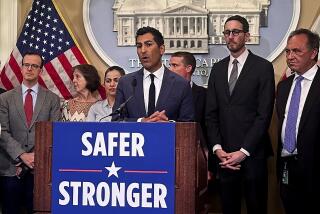Allegations against USC’s George Tyndall inspire lawmakers to take action

SACRAMENTO — California lawmakers on Monday acted to temporarily lift the statute of limitations on lawsuits for damages over sex abuse allegations against former USC campus gynecologist George Tyndall, accusations that were brought to light in a Pulitzer Prize-winning investigation by the Los Angeles Times.
The bill, which was approved unanimously Monday by the Assembly, now goes to Gov. Gavin Newsom for consideration.
Tyndall has pleaded not guilty to criminal charges that he engaged in sexual misconduct against 16 former patients at the campus clinic dating back to 2009. Nearly 400 women have made allegations against Tyndall to police and prosecutors covering other parts of his 27-year career at the university.
The statute of limitations for damages arising from a sexual assault that occurred when the victim was an adult is 10 years from the date of the last actionable conduct or three years from the discovery of the resulting injury, whichever is later.
The bill would allow lawsuits alleging improper sexual contact or communications by a physician at a student health center between Jan. 1, 1988, and Jan. 1, 2017.
Lawmakers, including Sen. Hannah-Beth Jackson (D-Santa Barbara), said an extraordinary response was needed to address the scandal.
“It is one for which egregious behavior has to be rectified,” Jackson said during a floor debate.
If the bill is signed by Newsom, claims of more than $250,000 could be filed for one year starting Jan. 1, 2020. Victims also have the option of joining a $215-million class-action settlement proposed by USC.
Assemblywoman Eloise Reyes (D-Grand Terrace) said her bill is needed because the current statute of limitations doesn’t provide sexual assault survivors adequate time to heal from the physical and emotional trauma of a sexual assault and prepare for a civil case.
“Survivors of sexual assault should never have their rights diminished or be denied their day in court because of delays and cover-ups by the very institutions that enabled the sexual assault to begin with,” Reyes said Monday. “The passage of this legislation tells survivors we heard them and we will hold those responsible accountable.”
The Legislature acted on the same day that state officials said Tyndall has surrendered his medical license.
Lawmakers are also considering a measure by Assemblyman Ian Calderon (D-Whittier) that requires health professionals conducting a pelvic exam to first provide the patient with a brochure that details what actions are appropriate in such an exam. The brochure would be provided by the Medical Board of California according to the legislation, which still requires a final vote on minor amendments.
A USC investigation found Tyndall performed physical exams that did not meet current practice standards and that he made inappropriate remarks to patients during the examination process.
The bill was opposed by the American Congress of Obstetricians and Gynecologists — District IX and the California Academy of Family Physicians.
The groups said in a letter to lawmakers that the bill includes “problematic” language. The groups agree that women should be properly informed of what to expect during a pelvic examination.
“However, requiring that such information be verified by a signature and placed in the patient’s medical record is both burdensome and unnecessary when the goal is to ensure the patient is properly informed,” the opposition letter said.
The California Medical Assn. raised similar concerns, adding a signature requirement “is inconsistent with other policy related to information sharing between a patient and physician and would have unintended consequences.”
More to Read
Sign up for Essential California
The most important California stories and recommendations in your inbox every morning.
You may occasionally receive promotional content from the Los Angeles Times.











